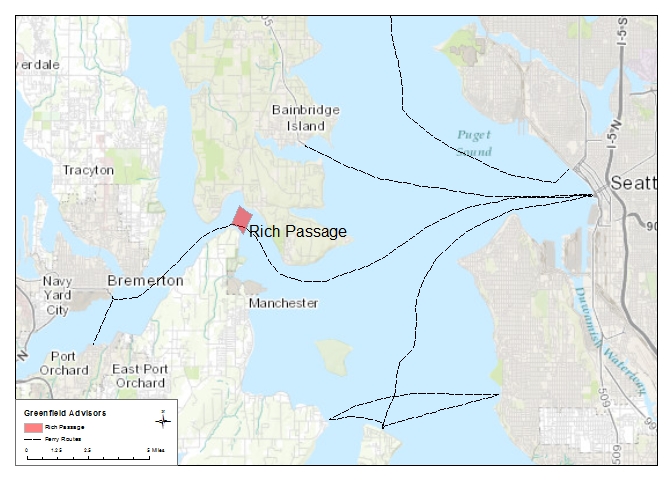Washington State Ferries (WSF) has offered ferry service between Seattle and Bremerton since the 1970s. One of the difficulties of this service is that ferries on the Bremerton-Seattle route must pass through Rich Passage, a narrow mile-long passage (roughly 2,624 feet or 800 meters wide at its narrowest point) between the Kitsap Peninsula and the southern end of Bainbridge Island. Property owners along the shores of Rich Passage first started complaining about the wake effects of passing ferries in the 1980s, when the Issaquah-Class ferries were introduced. In response, WSF slowed the vessels as they passed through Rich Passage, and for a short time, everyone seemed content.
That didn’t last long though—in the late ’80s, WSF introduced passenger-only fast ferry (POFF) service on the Bremerton-Seattle route with the MV Tyee and later the MV Skagit and MV Kalama. Commuters were thrilled with the faster speeds, but complaints from residents along Rich Passage increased, citing concerns about shoreline damage caused by the large wakes of these high-speed ferries. Once again, WSF voluntarily slowed their vessels through Rich Passage, but this time they also commissioned a study to determine whether their high-speed ferry operations had caused any damage to the shoreline and to develop a wake wash performance standard for the acquisition of new vessels. That study concluded that the shoreline had not suffered significant damage, but that long-term high-speed operation of the current vessels could be problematic, so WSF went shopping for vessels that would meet their new standard.
Operation of the MV Chinook, a twin-hulled catamaran specifically designed to provide environmentally friendly POFF service on the Bremerton-Seattle route, commenced in May 1998. Once again, the service was a hit with commuters, but once again, Rich Passage residents began to complain about shoreline damage. This time, rather than volunteering to slow the ferries, which computer modeling had showed should not be causing any harm to the Rich Passage shoreline, WSF offered to establish a fact-finding committee to study the issue further. Residents claimed that the ferry was creating wakes more than 6 feet high, causing large waves to crash over 10-foot bulkheads, sending seawater encroaching into their yards and causing severe beach erosion, destruction of kelp beds, and other irreparable ecological harm. Unappeased by the offer of a study committee, the residents took their complaints to court.
On March 9, 1999, a group of Kitsap County residents filed a class action lawsuit against the State seeking monetary damages and injunctive relief to slow the ferries, claiming inverse condemnation and violation of the Shoreline Management Act of 1971. Later, the property owners filed an amended complaint for declaratory and injunctive relief and damages, adding causes of action for trespass, negligence, nuisance, and violation of the State Environmental Policy Act (SEPA).

Photo of the MV Kitsap passing through Rich Passage courtesy of Wikimedia Commons user Compdude123, CC BY-SA 3.0.
On July 26, 1999, King County Superior Court Judge Glenda Hall ordered WSF to slow the ferries to 12 knots through Rich Passage while conducting environmental studies to comply with SEPA requirements. At the end of the year, the Chinook’s sister ship, the MV Snohomish, was added to the Bremerton-Seattle route, and the State, Kitsap County, and the City of Bremerton appealed to the State Supreme Court, who eventually overturned the preliminary injunction slowing the Chinook, declaring issuance of the injunction an abuse of the trial court’s discretion. However, the Supreme Court remanded the case back to the Superior Court for further proceedings.
In the end, the property owners and the State reached a settlement through mediation. The State agreed to pay affected property owners nearly $4.5 million for damage caused by the ferries and to continue monitoring Rich Passage shorelines for any additional wake effects. In exchange, property owners agreed to allow WSF to operate the ferries at 16 knots through the passage. Unfortunately, passenger-only ferry service was somewhat less popular at slower speeds, and when WSF’s funding was dramatically reduced by the passage of tax-cut Initiative 695, passenger-only ferry service was eliminated in 2003.
Meanwhile, the scientists conducting the SEPA review concluded that multiple natural and human factors—including high-speed passenger ferry operations—were causing erosion and bulkhead damage along the Rich Passage shoreline. Subsequently, the Federal Transportation Administration (FTA) and other agencies sponsored additional studies in the hopes of eventually finding a POFF solution suitable for the sensitive Rich Passage environment. Currently, transit agencies and consultants are still looking for an environmentally friendly and financially feasible way to deliver POFF service in this area.
Why so much interest in reestablishing a POFF line between Seattle and Bremerton? Well, in large part, it’s because we have a shortage of affordable housing in Seattle and a shortage of good jobs in Bremerton. Many people would like to take advantage of the lower housing prices in Bremerton and the better job market in Seattle, but without high-speed ferry service, the commute is a bit too long to be palatable. Studies have repeatedly shown that there is ample interest in Bremerton-Seattle POFF service, but according to Kitsap Transit board member Rob Gelder, “Frequency and convenience are the drivers.”







Recent Comments